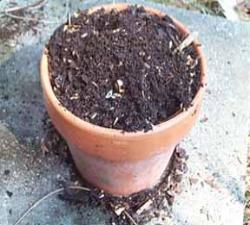![Hands sift through compost ready for use. [credit: uf/ifas]](/media/sfylifasufledu/sarasota/images/banner1650x470/2015_Comms_T4_compostHands_1650w.jpg)
How to Use Compost
There are many ways to use compost. Click any item below to learn more about the many uses (show all items).
Compost as soil amendment
Use compost as a soil amendment to increase the organic matter in the soil. Organic matter is critical for plant development and growth (see benefits of compost). Tropical and subtropical soils are notorious for their lack of this material. Whereas temperate soils may have up to 50 percent organic matter, sub-tropical soils typically have 1 percent or less. Compost can help raise organic matter in soils.
Because tropical and subtropical soils never freeze, microbial activity continues year-round. As a result, organic material is used up quickly. Because of biological soil activity and year-round warm weather, gardeners are advised to apply compost annually, or as needed, to increase soil organic matter content.
For best results, use only finished compost as a soil amendment. Compost used as a soil amendment should be applied and incorporated into the soil before planting crops, grasses, plants, etc. Apply 1-3 inches of compost to the soil surface and work it in to the soil to a depth of about 3-4 inches.
Unfinished Compost
Using unfinished compost as a soil amendment may stress plants, causing them to yellow or stalling their growth. This is because the decomposition process is continuing near the plant roots and the microorganisms in the compost are competing with the plants for nitrogen. You may want to compensate for this nitrogen imbalance by adding nitrogen fertilizer to soil applications of immature compost.
As an alternative, use compost as a mulch, and you don't have to worry about whether the compost is "finished" or not. This is because any additional decomposition is occurring above the root zone. The plants still benefit from the compost. (See the "Mulch" scetion on this page.)
Compost as mulch
The forest floor is a natural composting system in which leaves are mulch on the soil surface, and then gradually decompose, recycling nutrients and conditioning the soil. Likewise, yard debris such as leaves, grass clippings, or shredded branches can be used as mulch in the landscape and allowed to compost on the soil surface. Over time, the mulch will compost in place.
Finished or unfinished compost can be applied as a mulch 3-4 inches thick on the soil surface. Do not incorporate into the soil. Keep compost mulch 2-3 inches away from plant stems. Nutrients will filter into soil, without robbing nitrogen from the root zone.
Compost offers benefits similar to regular mulch: soil moisture retention, insulation from extreme temperatures, and provides nutrients and organic matter for soil structure. One disadvantage to using compost as mulch is that it will not act as a barrier to weed growth, but, in fact, will promote weed growth if not covered with a standard mulch material. Compost or mulch should be reapplied yearly to replenish the decomposing layer.
Compost as potting mix

Compost-filled plant pot
Compost can be used as an excellent potting soil for your container nursery. Compost offers good water retention qualities and some basic nutrients. However, gardeners should use only fully decomposed (called "cured" or "finished") compost as a potting mix.
Container-grown plants need a potting soil that retains moisture, but drains well. Most gardening enthusiasts blend compost with coarse sand, perlite, vermiculite, and/or similar materials to make optimal planting media.
If your compost still has large chunks in it, but is otherwise finished, you may want to screen compost through a 1/2-inch screen to remove material that has not yet decomposed. Materials that have not decomposed can rob nitrogen from the plant roots. Leaving some coarse or bulky material in the mix, though, will help maintain a well-drained planting media.
Caution: If the organic materials have not completely decomposed, plants growing in the compost media may turn yellow and appear stressed. This is because the decomposition process is continuing near the plant roots and the microorganisms in the compost are competing for nitrogen. See Compost Maturity Tests.
Compost as tea
Compost tea is a method of using your compost nutrients for indoor plants, potted plants with no room for additional soil, and foliar applications (spraying on plant leaves). To make compost tea, follow this procedure:
- Fill a woven bag (e.g., burlap) with finished* compost;
- Place the bag in a barrel or bucket of water;
- Let sit an hour;
- Remove the bag;
- Use the resulting liquid, "compost tea" to water plants; and
- Empty the contents of the bag into the garden and use as compost mulch or soil amendment.
*Using unfinished compost is not recommended due to possible pathogens and compounds which could damage plants. Only finished compost should be used.
Compost Tea Benefits
Compost tea contains nutrients and microorganisms from the compost, allowing you to apply these beneficial components to plants. Therefore, compost tea acts as a weak liquid fertilizer, low in nitrogen but high in micronutrients.
If your plants are container grown, there may be no room to add compost to the pots. Additionally, soil should not be built up against the stems of many plants. Compost tea is a good option for applying the benefits of compost to container-grown plants.
Learn More
- Natural Resources